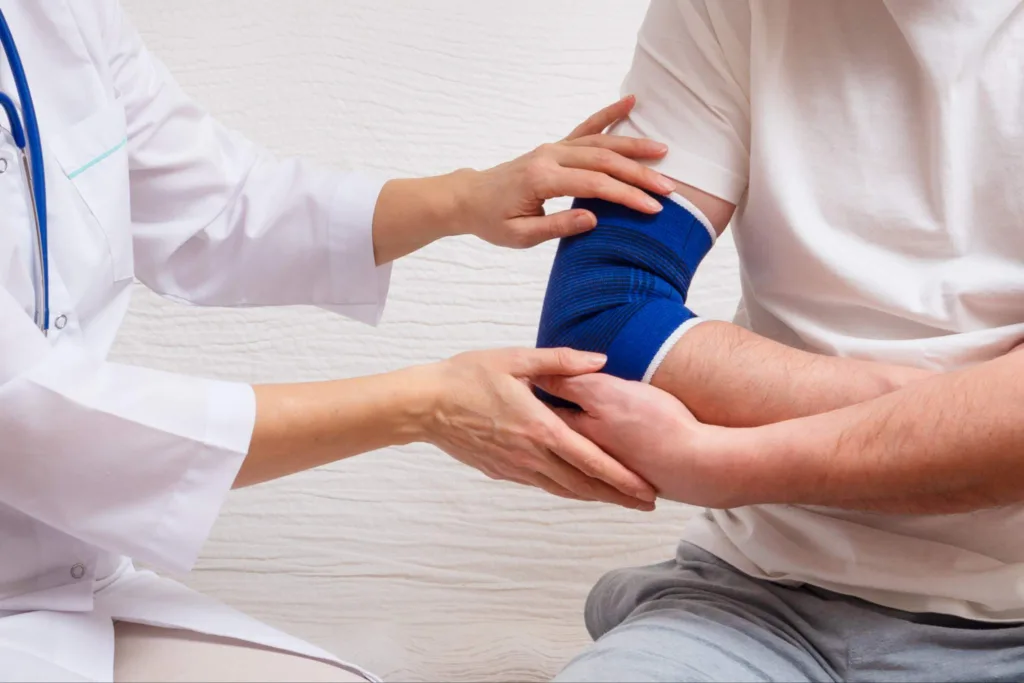Car accidents can be traumatic events, often leaving behind more than just visible injuries. One of the most concerning hidden injuries that may result from an accident is nerve damage. Nerve damage can be subtle, with symptoms sometimes appearing long after the initial impact.
Nerve damage occurs when the nerves that transmit signals between the brain and the rest of the body are injured. These injuries can result from the direct impact of the accident, compression from swelling, or even due to herniated discs pressing on the nerves. Recognizing the signs of nerve damage early is crucial for getting the appropriate treatment and preventing long-term complications.
1. Persistent Tingling or Numbness After a Car Accident
One of the earliest signs of nerve damage after a car accident is persistent tingling or numbness in the extremities, particularly in the hands, feet, arms, or legs. This sensation, often described as a “pins and needles” feeling, occurs because of nerve compression or injury to the peripheral nerves. It can start as a mild annoyance but, if left untreated, may worsen over time, leading to more severe nerve issues.
This tingling or numbness can significantly affect your daily activities, making it difficult to perform tasks that require fine motor skills, like typing or holding objects. In some cases, these symptoms might indicate conditions like carpal tunnel syndrome, radiculopathy, or even herniated discs, where the nerves are being compressed.
2. Muscle Weakness or Loss of Function Due to Nerve Damage
Another critical sign of nerve damage is muscle weakness or a noticeable loss of function in the affected area. This symptom arises because nerves are responsible for transmitting signals from the brain to the muscles, enabling movement and strength. When these signals are disrupted due to nerve damage, the muscles may not respond correctly, leading to weakness or even partial paralysis.
You might notice difficulty in performing everyday tasks such as lifting objects, climbing stairs, or maintaining balance. This weakness can be particularly alarming if it worsens over time or spreads to other areas of the body. If nerve damage is the cause, prompt treatment is necessary to avoid long-term disability and restore muscle function.
3. Sharp, Burning, or Shooting Pain: A Sign of Nerve Damage
Sharp, burning, or shooting pain is often a direct consequence of nerve damage, and it can be one of the most distressing symptoms. This type of pain, sometimes described as a “pins and needles” sensation, indicates that the nerves are misfiring or have been damaged. The pain can be constant or intermittent and may worsen with movement or pressure on the affected area.
Conditions like neuropathy or sciatica, where this type of pain is prevalent, often accompany nerve damage. The location of the pain can also provide clues about which nerves are affected, aiding in diagnosis and treatment.
4. Increased Sensitivity to Touch or Temperature Following an Accident
After a car accident, some individuals may experience increased sensitivity to touch or temperature, a condition known as allodynia. This symptom occurs when even light touches or slight changes in temperature cause discomfort or pain, a clear indicator of nerve damage.
This heightened sensitivity can make everyday tasks like showering, dressing, or even sleeping extremely challenging.
5. Balance and Coordination Issues from Nerve Damage
Nerve damage can significantly disrupt your body’s ability to maintain balance and coordination. Nerves are essential for transmitting signals that control movement and balance, and when these signals are disrupted, it can result in unsteadiness or frequent stumbling.
You might notice that your gait is unsteady, or you have difficulty coordinating your movements, such as when trying to walk in a straight line or maintain balance on uneven surfaces. These issues are often indicative of damage to the nerves controlling the lower extremities or the vestibular system, which governs balance.
6. Digestive or Bladder Control Problems
Nerve damage, particularly to the autonomic nerves, can lead to problems with digestion or bladder control after a car accident. The autonomic nervous system controls involuntary bodily functions, including those related to the digestive system and bladder.
Symptoms might include constipation, incontinence, or difficulty urinating. These issues might indicate more extensive nerve damage and should be evaluated promptly.
7. Chronic Headaches or Migraines Linked to Nerve Damage
Chronic headaches or migraines can be linked to nerve damage, especially if the neck or spine is involved. Cervicogenic headaches, for instance, originate from issues in the cervical spine, where nerve damage might occur following a car accident.
These headaches can be persistent and debilitating, affecting your concentration, sleep, and overall quality of life. They often indicate underlying issues such as whiplash or other spinal injuries that need to be addressed.
Which Doctors Can Help with Nerve Damage After a Car Accident?

When it comes to diagnosing and treating nerve damage after a car accident, several healthcare professionals can provide specialized care. Each of these specialists plays a crucial role in ensuring accurate diagnosis and effective treatment:
- Neurologists: These doctors specialize in diagnosing and treating disorders of the nervous system, including nerve damage. They conduct detailed neurological exams and may use imaging tests or nerve conduction studies to pinpoint the extent and location of the damage.
- Car Accident Chiropractors: Chiropractors focus on the musculoskeletal system, particularly the spine. They can help alleviate nerve pressure through spinal adjustments, reducing symptoms like pain, tingling, or numbness.
- Orthopedic Surgeons: Specializing in the musculoskeletal system, orthopedic surgeons can address nerve damage that might require surgical intervention, particularly if it’s related to bone or joint issues.
- Physical Therapists: Physical therapists play a key role in the recovery process, designing rehabilitation programs that strengthen muscles, improve mobility, and restore function impacted by nerve damage.
- Pain Management Specialists: These doctors are experts in managing chronic pain, often using medications, injections, or other treatments to help control nerve pain and improve quality of life.
Each of these specialists contributes to a comprehensive treatment plan that addresses both the immediate symptoms and the underlying causes of nerve damage, ensuring a holistic approach to recovery.
Post-Car Accident Care at Affordable Chiropractic Killeen
Early detection and treatment are key to mitigating the impact of nerve damage and promoting effective recovery. At Affordable Chiropractic Killeen, we provide a holistic approach to injury care, including chiropractic care, spinal decompression, active rehabilitation, and on-site X-rays, all aimed at addressing the root causes of your pain and discomfort.
If you or a loved one is experiencing symptoms of nerve damage following a car accident, don’t wait to seek help. Schedule an appointment today to start your journey toward recovery and regain your quality of life.

